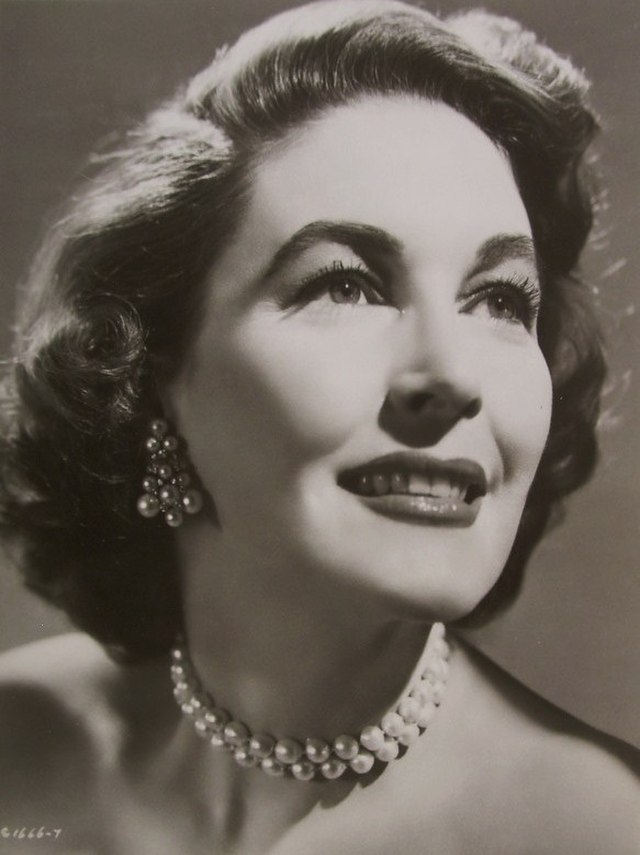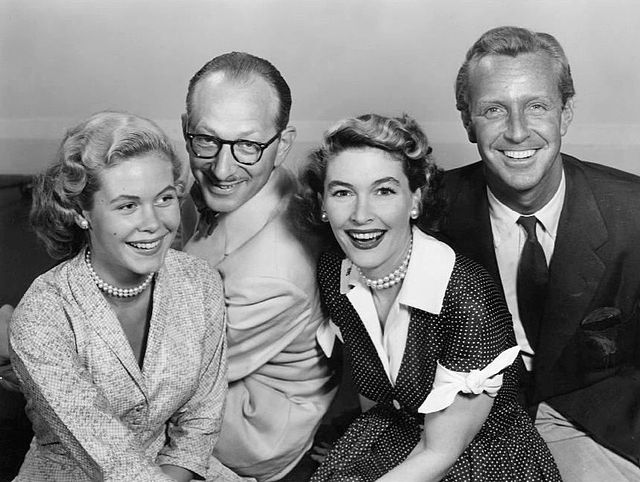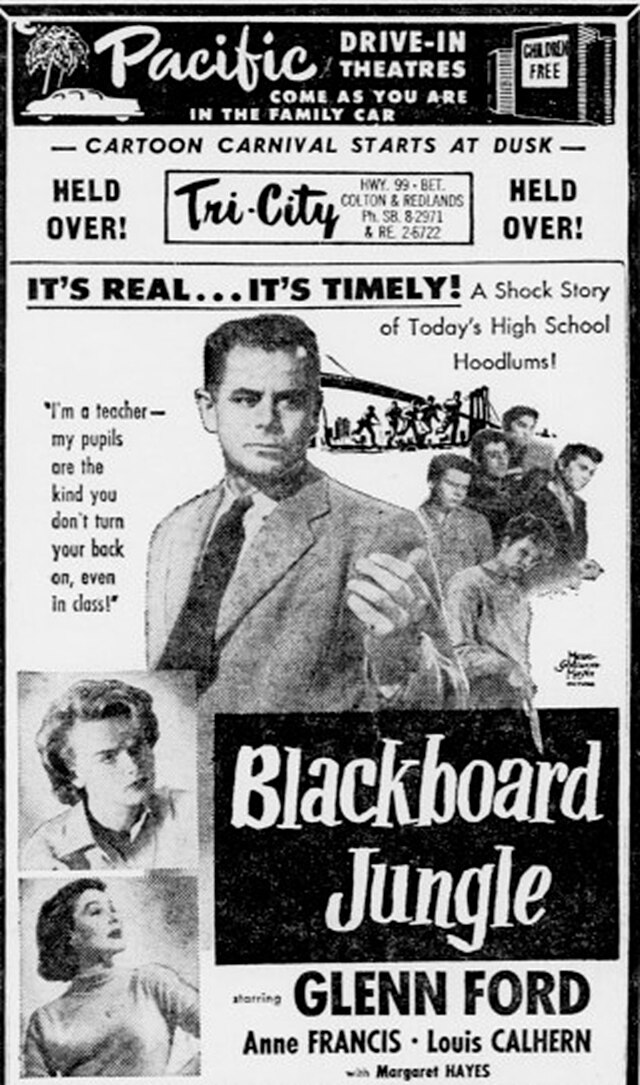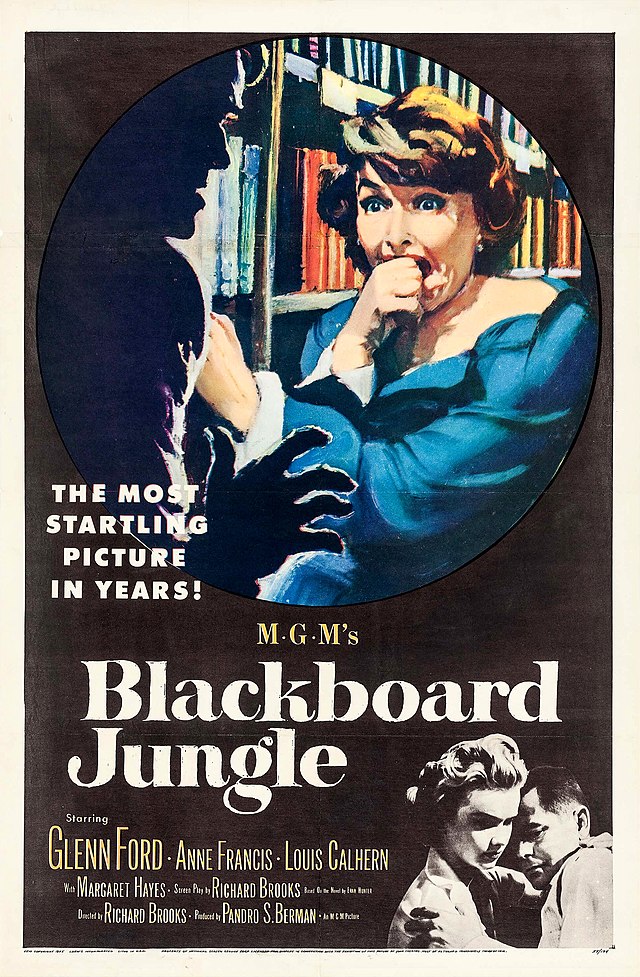Margaret Hayes
back| Full Name | Florette Regina Ottenheimer |
| Stage Name | Margaret Hayes |
| Born | December 5, 1916 |
| Birthplace | Baltimore, Maryland, United States |
| Died | January 26, 1977 |
| Buried | Cremated, ashes scattered in the Pacific Ocean |
| Married to | Charles De Bus (married in 1947, divorced in 1948) - Herbert Bayard Swope Jr. (married in 1951, divorced in 1963) - Robert Gordon MacNab (married in 1966, until her death in 1977) |
| Children | Tracy Brooks Swope |
| Notable films | Blackboard Jungle (1955) - My Six Convicts (1952) - The Glass Menagerie (1950) - The Case of the Curious Bride (1935) |
Margaret Hayes
Talented Maggie
Margaret Hayes was a talented American actress known for her versatility across film, television, and stage. She began her career in modeling before transitioning to acting, adopting the stage name Margaret Hayes.
Her most notable film role came in the critically acclaimed “Blackboard Jungle” (1955), where she portrayed Lois Hammond, the supportive wife of a high school teacher facing juvenile delinquency.
Throughout the 1940s and 1950s, Hayes appeared in a variety of films and television shows, including "My Six Convicts" and "Alfred Hitchcock Presents," showcasing her range from drama to comedy.
Related
Margaret Hayes (1916 – 1977)
Biography and Movie Career
Margaret Hayes, born Florette Regina Ottenheimer on December 5, 1916, in Baltimore, Maryland, was raised in a comfortable, middle-class family. She grew up with a fascination for the arts, influenced by her surroundings and the vibrant cultural scene of Baltimore. From a young age, Hayes showed a natural inclination toward performing, which was further nurtured by her education. She attended Forest Park High School in Baltimore, where her involvement in school plays and theater activities solidified her love for acting. After high school, she pursued higher education at Johns Hopkins University, a notable decision at a time when it was less common for women to attend college. Her academic background provided her with a broader perspective and a grounding that would serve her well in her acting career.
Career Beginnings and Path to Success
Margaret Hayes's journey to becoming a celebrated actress began with modeling. Her striking looks and poised demeanor quickly gained attention, leading to opportunities in the fashion world. Seeking to expand her horizons, she moved to New York City, where she hoped to make a name for herself in acting. Initially, she faced the challenges typical of young actresses: limited roles, competition, and the need to establish herself. During this period, she experimented with different stage names, including Dana Dale and Dana Edwards, before settling on the name Margaret Hayes, which would become her professional identity.
Her early acting career was characterized by small roles and guest appearances in films and on television. One of her earliest film appearances was in "The Case of the Curious Bride" (1935), where she played a minor part. Throughout the 1940s and early 1950s, Hayes continued to build her résumé, appearing in a mix of film noir, comedies, and dramas. Her work ethic and talent did not go unnoticed, and she began to land more substantial roles.
Breakthrough and Notable Roles
Hayes’s breakthrough role came in 1955 with the critically acclaimed film "Blackboard Jungle." She was cast as Lois Hammond, the wife of the film's lead character, played by Glenn Ford. "Blackboard Jungle" was a significant film of its time, addressing social issues such as juvenile delinquency and the challenges of urban education. Hayes's portrayal of Lois Hammond, a supportive yet concerned spouse, resonated with audiences and critics alike, bringing her widespread recognition. The film's success helped establish Hayes as a respected actress capable of delivering strong, emotionally compelling performances.
In addition to "Blackboard Jungle," Hayes appeared in several other notable films and television productions. She starred in "My Six Convicts" (1952), a drama that further showcased her versatility. She also took part in the 1950 television adaptation of Tennessee Williams's "The Glass Menagerie," a challenging and iconic role that added to her credibility as a serious actress.
Television Career
As television became a dominant medium in the 1950s and 1960s, Margaret Hayes transitioned to the small screen, where she found a steady stream of work. She made numerous guest appearances on popular television series of the time. Her credits included roles on "Perry Mason," "Alfred Hitchcock Presents," "The Twilight Zone," and other series that showcased her range across different genres. Hayes was known for her ability to adapt to a variety of roles, from dramatic characters to those with a comedic touch.
Personal Life and Marriages
Margaret Hayes's personal life was as eventful as her career. She was married three times, each marriage reflecting different phases of her life and career. Her first marriage was to Charles De Bus, a union that was short-lived, lasting only from 1947 to 1948. The reasons for their separation are not well documented, but it was clear that her career ambitions played a significant role in her life choices.
In 1951, Hayes married Herbert Bayard Swope Jr., the son of a Pulitzer Prize-winning journalist and editor. This marriage brought her into the circles of New York’s elite society and media world. Together, they had a daughter, Tracy Brooks Swope, who would follow in her mother’s footsteps and become an actress. Despite the seemingly promising match, Hayes and Swope's marriage ended in divorce in 1963. The pressures of Hayes's career and the social demands of their lifestyle likely contributed to the dissolution of their marriage.
Her third and final marriage was to Robert Gordon MacNab in 1966. This marriage provided Hayes with stability and companionship later in life. MacNab, a businessman, shared Hayes's interests and offered a respite from the demands of Hollywood.
Passions and Interests
Beyond her acting career, Margaret Hayes was passionate about fashion and philanthropy. Her early days as a model instilled in her a love for style, and she was known for her sophisticated sense of fashion. Hayes often participated in social events and charity functions, using her celebrity status to support various causes. Her involvement in philanthropic endeavors highlighted her desire to give back to the community and use her influence for positive change.
Later Years and Death
As the years progressed, Hayes's appearances on screen became less frequent. She continued to work in television into the early 1970s but gradually retreated from the public eye. Her later years were marked by her commitment to her family, her passion for social causes, and a quieter life away from the limelight.
Margaret Hayes passed away on January 26, 1977, at the age of 60. Her death was attributed to hepatitis and cancer, which had afflicted her in her final years. Hayes was cremated, and in accordance with her wishes, her ashes were scattered over the Pacific Ocean, symbolizing her enduring love for the sea and her desire to remain free and untethered even in death.
Margaret Hayes left behind a legacy as a talented actress whose work spanned several decades and mediums. Her most iconic role in "Blackboard Jungle" remains a testament to her ability to portray complex emotions and connect with audiences. Hayes is remembered not only for her contributions to film and television but also for her grace, elegance, and the integrity she brought to both her professional and personal life. Her daughter, Tracy Brooks Swope, continues to honor her memory, carrying forward the artistic spirit that defined Margaret Hayes's life.
Margaret Hayes Great Performance in Blackboard Jungle:
Analysis of Margaret Hayes's Acting Style
Margaret Hayes was a versatile and nuanced actress whose performances spanned a wide range of genres, including drama, noir, comedy, and television series. Her acting style was characterized by a blend of sophistication, emotional depth, and a natural presence that made her both relatable and compelling on screen. Here’s a detailed analysis of the distinctive elements of her acting style:
Emotional Authenticity:
One of the hallmarks of Margaret Hayes's acting was her ability to convey deep, genuine emotions. Whether she was playing a supportive wife, a concerned mother, or a woman facing moral dilemmas, Hayes brought a sincerity to her roles that resonated with audiences. Her performance in “Blackboard Jungle” as Lois Hammond exemplifies this quality. As the wife of the film's protagonist, Hayes infused her character with warmth, empathy, and quiet strength, making the audience care about her struggles and fears. Her eyes and subtle facial expressions were particularly effective in communicating her character's inner emotional world, allowing her to convey a lot with very little dialogue.
Versatility Across Genres:
Hayes was known for her adaptability and her ability to transition seamlessly between different genres. She moved easily from the tension of film noir to the lightheartedness of romantic comedy. This versatility is evident in her roles in “Dangerous Passage” and “Cinderella Jones.” In the former, she played a part in a suspense-filled thriller, capturing the anxiety and tension of a woman involved in a dangerous plot. In the latter, she embraced the comedic elements of a scatterbrained romance, showcasing her timing and ability to deliver lines with a sense of fun and lightness.
Strong, Yet Subtle Presence:
Margaret Hayes often played characters who possessed an understated strength. She was not the type to dominate the screen with overt displays of emotion or dramatics. Instead, she commanded attention through her poise and the quiet intensity she brought to her roles. Her performances were often marked by a calm exterior that hinted at a deeper complexity beneath the surface. In “My Six Convicts,” she played Clara, a woman who exudes patience and understanding, showcasing her ability to embody characters who were both nurturing and quietly resilient. Hayes’s strength was never about physical power but about moral fortitude and inner resolve.
Ability to Portray Complex Relationships:
Hayes had a talent for depicting the intricacies of human relationships, particularly those involving love, loyalty, and conflict. She was often cast in roles that required her to interact with strong male leads, and she was adept at establishing a believable rapport with her co-stars. This skill is evident in her role in “The Glass Menagerie,” where she portrayed Amanda Wingfield. Her interpretation of Amanda was multifaceted; she was both the controlling, overbearing mother and a woman whose dreams had been crushed, displaying vulnerability. Hayes's interactions with her on-screen children were layered with both tension and tenderness, reflecting the complexity of familial bonds.
Use of Body Language and Subtle Expressions:
Hayes’s acting was marked by her controlled use of body language and subtle expressions. Unlike some of her contemporaries, who relied heavily on grand gestures and vocal inflections, Hayes employed a more restrained approach. She used her posture, gestures, and the slightest changes in her facial expressions to convey her character's thoughts and feelings. This restraint made her performances feel more realistic and grounded, allowing her to convey emotion without overwhelming the scene. In roles where she played anxious or troubled characters, Hayes's slightly furrowed brow or the clenching of her hands added depth to her portrayal, indicating her character’s inner turmoil.
Classical Elegance:
Margaret Hayes brought a sense of elegance and grace to her roles. Her background in modeling may have contributed to her refined presence, which was evident whether she was in a period piece or a contemporary setting. Her demeanor often suggested a character who was well-educated, cultured, and self-aware. This elegance made her a perfect fit for roles that required a sophisticated, intelligent woman. In her later television work, she often played characters that were authoritative and composed, maintaining her air of class and dignity.
Strong Supporting Roles:
Throughout her career, Hayes was frequently cast in strong supporting roles, where she excelled in complementing the leads and enriching the storyline. Even in these supporting parts, she managed to leave a lasting impression through her nuanced performances. In “When Strangers Marry,” for example, Hayes played a supporting character whose presence added layers to the mystery and tension of the film. Her ability to shine in such roles was a testament to her talent and professionalism, as she never allowed her performances to be overshadowed by the leads.
Conclusion
Margaret Hayes’s acting style was defined by her emotional authenticity, versatility, and ability to bring depth to every role she played. Her approach to acting was subtle yet impactful, making her a memorable presence in the films and television series she graced. Whether portraying a nurturing mother, a distressed wife, or a woman caught in the throes of moral dilemmas, Hayes's performances were consistently marked by a naturalism that connected with audiences. Her legacy as an actress lies in her ability to bring the written word to life with grace, intelligence, and an unwavering commitment to her craft.
Recognition and Awards
-
Critical Acclaim for "Blackboard Jungle" (1955):
While Margaret Hayes did not receive individual awards for her role in "Blackboard Jungle," the film itself was highly acclaimed and is considered a landmark in addressing social issues in American cinema. Her portrayal of Lois Hammond, the wife of Glenn Ford's character, was noted for its sensitivity and realism, which contributed to the film's overall impact. The movie received several nominations, including an Academy Award nomination for Best Adapted Screenplay, and was recognized for its powerful depiction of juvenile delinquency and urban education.
-
Television Recognition:
During the 1950s and 1960s, Hayes became a familiar face on television, appearing in numerous guest roles in popular series like "Perry Mason," "Alfred Hitchcock Presents," and "The Twilight Zone." While she did not win specific awards for her television work, her consistent presence in these high-profile series demonstrated her talent and versatility as an actress. Hayes was part of the generation of actors who helped transition Hollywood talent to the small screen, setting the stage for the future of television acting.
-
Stage Recognition:
Hayes also had a background in theater, including her role in the television adaptation of Tennessee Williams' "The Glass Menagerie." Her portrayal of Amanda Wingfield in this and other stage productions was well-regarded, showcasing her ability to handle complex, emotionally demanding roles. Though formal awards for stage performances were less common during her era, her involvement in such respected productions added to her professional credibility.
-
Philanthropic Involvement and Industry Respect:
Beyond specific awards, Margaret Hayes was recognized for her professionalism and dedication to her craft. She was involved in philanthropic activities, reflecting her desire to contribute positively to society. Her peers in the industry respected her for her talent, versatility, and the grace she brought to her work both on and off the screen.
Memorable Quotes from Her Roles
- "Blackboard Jungle" (1955) as Lois Hammond
Quote: "It's not the kids, it's the system. The system's broken."
Context: In "Blackboard Jungle," Hayes plays the supportive wife of Richard Dadier (Glenn Ford), a teacher dealing with delinquent students. Her line reflects the broader social message of the film about the challenges of urban education and the need for systemic change.
- "Dangerous Passage" (1944) as Nita Paxton
Quote: "You never know who you can trust these days. Even the sea has its secrets."
Context: As Nita Paxton, Hayes's character gets entangled in a suspenseful plot set aboard a ship. This line captures the film's atmosphere of suspicion and the lurking dangers of the unknown.
- "My Six Convicts" (1952) as Clara
Quote: "Every man deserves a second chance, but it’s what he does with it that counts."
Context: Hayes's character in "My Six Convicts" works closely with prisoners, reflecting themes of redemption and rehabilitation. This line underscores the film's focus on understanding and reforming rather than simply punishing those who have committed crimes.
Quotes about Margaret Hayes
Though not direct quotes from Hayes, there are some reflections from critics and contemporaries that highlight her talent and presence:
- Critic’s Review (regarding "Blackboard Jungle"):
"Margaret Hayes brings a quiet strength to the role of Lois, standing as a moral center against the chaos of the classroom."
Context: Critics often praised Hayes for her nuanced performances, recognizing her ability to convey depth and emotional truth in supporting roles.
- Co-Star Commentary:
"Working with Margaret was a study in professionalism. She had this way of making every scene feel real, no matter how small the part."
Context: Actors and directors who worked with Hayes respected her for her dedication to her craft and her ability to elevate the scenes she was in.
Movies Starring Margaret Hayes:
1930s
- "The President Vanishes" (1934)
Synopsis: This political thriller, based on a novel by Rex Stout, centers on the mysterious disappearance of the U.S. President amidst political turmoil and threats of war. Although Margaret Hayes had a minor role, the film was notable for its commentary on the rise of fascism and isolationism.
- "The Case of the Curious Bride" (1935)
Synopsis: A pre-code mystery film in the "Perry Mason" series, where the famous attorney Perry Mason investigates the case of a woman whose supposedly dead husband has been spotted alive. Hayes had a small role, showcasing her early involvement in the film industry.
- "Les Misérables" (1935)
Synopsis: An adaptation of Victor Hugo's classic novel, this film focuses on Jean Valjean, an ex-convict, and his lifelong struggle for redemption while being pursued by Inspector Javert. Margaret Hayes appeared in a minor, uncredited role, typical of her early career beginnings.
- "Crime and Punishment" (1935)
Synopsis: Based on Fyodor Dostoevsky's novel, this film tells the story of Raskolnikov, a young man who commits murder and is plagued by guilt and paranoia. Margaret Hayes's role was uncredited, as she was still establishing herself in Hollywood.
- "Forgotten Faces" (1936)
Synopsis: A melodrama about a man released from prison, seeking revenge on those who wronged him, while his daughter falls in love with an attorney. Margaret Hayes appeared in a small role, continuing to build her acting portfolio.
1940s
- "There’s That Woman Again" (1939)
Synopsis: This mystery-comedy follows a detective and his wife as they get entangled in a murder case involving a stolen necklace and mistaken identities. Margaret Hayes had a minor role, contributing to her growing experience in the film industry.
- "Rookies in Burma" (1943)
Synopsis: A World War II comedy about two Army recruits who find themselves in the midst of a battle in Burma. Hayes played the role of Mary, a significant part of the ensemble cast, demonstrating her versatility in both dramatic and comedic roles.
- "Youth Runs Wild" (1944)
Synopsis: Directed by Mark Robson, this film examines the lives of American teenagers left to their own devices during World War II, leading to juvenile delinquency. Hayes played the role of Beulah, a character that added depth to the social issues explored in the film.
- "Roger Touhy, Gangster" (1944)
Synopsis: A crime drama based on the life of the real gangster Roger Touhy, focusing on his involvement in organized crime and eventual capture. Hayes appeared in a supporting role, adding to her repertoire of crime-related films.
- "Dangerous Passage" (1944)
Synopsis: A noir thriller about a man who inherits a fortune and faces deadly challenges aboard a ship. Hayes played the female lead, Nita Paxton, showcasing her ability to carry significant roles in suspenseful narratives.
- "When Strangers Marry" (1944)
Synopsis: A suspenseful film noir about a woman who suspects her husband might be a killer. Margaret Hayes had a key supporting role, playing a character that added complexity to the plot's twists.
- "Cinderella Jones" (1946)
Synopsis: A romantic comedy about a scatterbrained girl who must marry to inherit a fortune, with several suitors vying for her hand. Hayes played a supporting role, contributing to the film's light-hearted and comedic tone.
- "The Walls Came Tumbling Down" (1946)
Synopsis: A mystery involving a journalist investigating a series of murders connected to an ancient religious manuscript. Hayes played the role of Louise Mason, demonstrating her talent in mystery and thriller genres.
- "Black Market Babies" (1945)
Synopsis: This drama focuses on the illegal adoption industry, where babies are sold to desperate couples. Hayes played a pivotal role as Ruth, highlighting her ability to tackle socially relevant and serious topics.
1950s
- "My Six Convicts" (1952)
Synopsis: A comedy-drama based on the autobiographical book by Donald Powell Wilson, about a psychologist working in a prison and his interactions with six prisoners. Hayes played the female lead, Clara, displaying her skill in portraying empathetic and engaging characters.
- "The Glass Menagerie" (1950) - TV Adaptation
Synopsis: A television adaptation of Tennessee Williams's play, focusing on the fragile and tragic life of the Wingfield family. Hayes played Amanda Wingfield, the overbearing mother, a role that demanded emotional depth and complexity.
- "Guilty Witness" (1955)
Synopsis: A crime drama where a witness to a murder finds herself in danger. Hayes had a significant role, showcasing her adaptability in the evolving crime genre.
- "Blackboard Jungle" (1955)
Synopsis: A landmark film focusing on the challenges of teaching in a violent, inner-city high school. Hayes played Lois Hammond, the supportive wife of the protagonist, played by Glenn Ford. Her role added a human touch to the film's gritty narrative, marking it as one of her most memorable performances.
1960s
- "The Story of Ruth" (1960)
Synopsis: A biblical drama telling the story of Ruth, a Moabite woman who converts to Judaism and becomes an ancestor of King David. Hayes played a supporting role, contributing to the film's historical and religious themes.
- "Desire in the Dust" (1960)
Synopsis: A southern Gothic drama involving love, betrayal, and murder in a small town. Hayes had a key supporting role, adding to the film's intense and dramatic narrative.
1970s
- "Kidnapped" (1971)
Synopsis: An adaptation of Robert Louis Stevenson’s novel, focusing on the adventures of David Balfour, who is kidnapped and sent to sea by his greedy uncle. Hayes appeared in a supporting role, demonstrating her continued involvement in diverse film genres.




